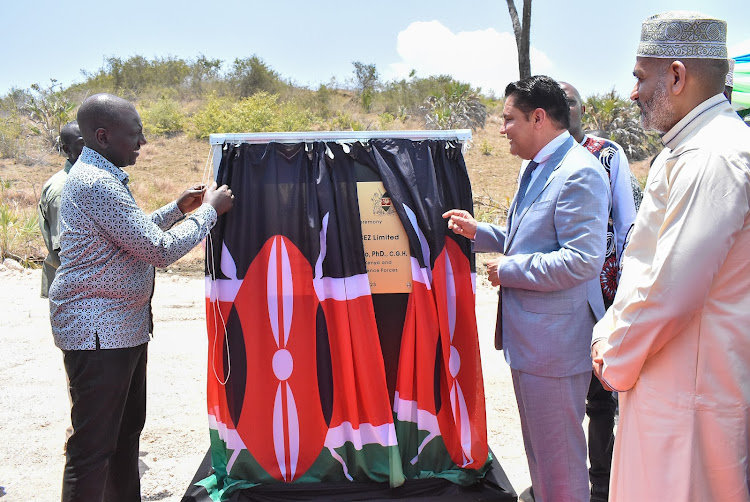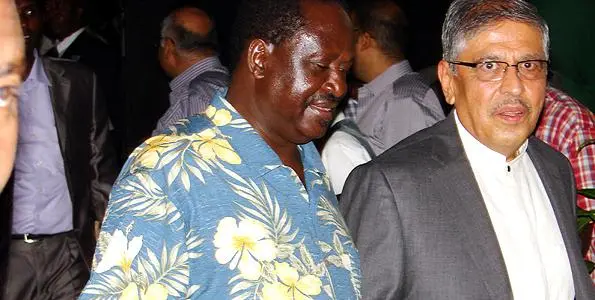President on Thursday announced that the government will subsidise the cost of the 6kg gas cylinder by Sh2,000. Currently, a 6kg cylinder costs about Ksh2,800, and with the subsidy, the price will fall to about Ksh500 in the next financial year beginning July this year.
This he said is in line with the government’s plan to increase the use of clean energy and reduce the use of fuel wood. The President, who was speaking at the relaunch of the 15-year-old Women Enterprise Fund in Nairobi, also announced that 8 per cent VAT on gas will be removed. This he said will equally bring the prices of the product down significantly.
For years, Mohammed Jaffer through his company African Gas and Oil Company Limited (AGOL) has been able to maintain the hold of liquid petroleum gas (LPG) industry. According to Energy CS Davis Chirchir, the firm controls 75 percent of the country’s gas supply. And now Ruto’s plan for cheaper gas spells doom for the empire that has rested on the monopoly.
A grand schemer, Jaffer has sailed through the regimes of Moi, Kibaki and Uhuru to create and maintain a monopoly in the oil, grain and gas industries. Like a chameleon, the oligarch has been able to create relationships with every regime and camouflage.
His other successful venture is Grain Bulk Handling Limited (GBHL). A report by the Finance Committee reported Grain Bulk controls 98 per cent of all grain imports and has been in operations since 2002.
Cheap Gas
Through popular brands; ProGas and Sea Gas owned by his company Proto Energy, Jaffer has been controlling the LPG market in the recent years. The government in 2016 formulated an ambitious plan for cheap gas and launched the Mwananchi Gas Project ‘Gas Yetu’. The announcement of the subsidized gas have hopes to many Kenyans who rely on toxic energy sources such and kerosine and firewood.
Mwananchi Gas project was to sell under the Gas Yetu brand and was meant to safeguard the poor from respiratory diseases caused by the use of firewood for cooking. It was also meant to contain the rampant destruction of forests.
In 2017 Gas Yetu was allocated Ksh2.2 billion for the period 2017-2019. A further Ksh700 million was allocated through a supplementary budget raising the total cost of the project to Ksh2.9 billion.
The project would have seen millions of households receive subsidized 6kg cooking gas cylinders at a cost of Ksh2,000.
5 million households were targeted with the Gas Yetu cylinders fitted with burners and grills.
The beneficiaries would refill them at a cost of only Ksh840 per cylinder.
This project was strategically shot down.
It all started with a contract awarded by the Petroleum Ministry and the National Oil Corporation of Kenya (Nock) to a consortium led by Allied East Africa Ltd.
Having gotten the tender, but with no capacity to deliver, the consortium turned to Mohammed Jaffer owner of Africa Gas and Oil (AGOL) which also owns Proto Energy Limited under which Pro Gas is sold.
The company was then just beginning and was virtually unknown in the country.
Jaffer had however managed to obtain a lease for use of a cylinder pressing machine from KPA in a shady deal that seems to have been orchestrated by officials from the Energy Ministry.
The fraudulent suppliers, in the first batch, delivered faulty cylinders raising questions about quality assurance and monitoring of the manufacturing process.
A total of 67,251 cylinders were found to be leaking posing a serious safety hazard had they gone into circulation.
This, however, seemed to be part of the grand plan to kill the project as then PS Andrew Kamau canceled the tender purchase order of 357,000 cylinders despite money having been paid out to East Africa Allied and Mohammed Jaffer.
The PS also canceled another purchase order of 700,000 cylinders with little explanation as to how the total budgetary allocation that had risen to Ksh2.9 billion had been spent.
This necessitated Consumers Federation of Kenya (COFEK) to sue Government in October 2018.
COFEK told court the Government’s ambitious program to buy and supply 5 million subsidized gas cylinders to low- and middle-income households by end of 2019 were in jeopardy as 60% of the cylinders delivered were faulty.
As Kenyans continued wondering why the Gas Yetu project is not taking off despite the immense benefits it would have afforded them, a new player in the market was beginning to emerge.
With its bright pink colored cylinders, Jaffer’s Pro Gas was starting to penetrate into the market offering gas cylinders at cheaper rates than competitors.
In October 2018, at the height of the Gas Yetu scandal, DCI George Kinoti said he will begin investigations into the loss of billions.
“We will initiate a probe. We cannot allow a program that is funded by taxpayers to put Kenyan citizens at risk,” said Mr Kinoti.
Years later, no investigations have been done and no one has been taken to court over the scam.
The AGOL plant and Proto Energy, the maker of Pro Gas, have offered Mr Jaffer a firm grip on the lucrative cooking gas market.
Rostam Aziz
With the 75 percent control of LPG, Jaffer has had an upper hand in pricing control of the cooking gas and with the death of subsidized gas, the field has been left open for him and that’s why the entrance of Tanzanian billions Rostam Aziz into the Kenyan market is not only a blow but a spell of doom to the future of the Mombasa tycoon whose empire has thrived in monopoly and survived through regimes he’s been able to cut deals with.
In February, Kenya offered the Tanzanian billionaire the licence to set up a cooking gas plant and storage facilities at the Mombasa port, averting a potential trade spat between the two neighboring countries.
The energy regulator cleared Taifa Gas, which is owned by Aziz who had previously lamented that Kenya had gone quiet over his enquiries to build a 30,000-tonne LPG handling facility in the country.
The entry of the business magnate, who was ranked the first dollar billionaire in Tanzania by Forbes in 2013, signals a vicious battle for control of the Kenyan cooking gas market that remains under the tight leash of the Mombasa-based tycoon Mohamed Jaffer.
Mr Aziz had in 2021 complained that Nairobi went mute on his 2017 enquiry to build an LPG plant, lamenting the barriers for Tanzanian entrepreneurs seeking a presence in Kenya.
Taifa Gas is the largest LPG supply company in Tanzania and has been feeding the Kenyan retail market via road.
Now, Mr Aziz is seeking a large share of Kenya’s LPG market.
It also sets the stage for a billionaires’ fight pitting Mr Jaffer and Mr Aziz, 58, that is first expected to cut the cost of handling and evacuating cooking gas from the ships to the mainland, allowing dealers to transfer the cost reliefs to consumers.
Just like Mr Jaffer, Mr Aziz has invested in building political networks that saw him serve as MP and treasurer of the Tanzanian ruling party Chama Cha Mapinduzi (CCM). Jaffer is said to have financed the campaigns of the unsuccessful presidential bid of Raila Odinga and through his high connections enjoyed protection of his business empire during the handshake tenure.
During the launch of the Taifa Gas plant in Dongo Kundu, the president directed for tax on gas to be cut in a bid to lower the prices of gas.
Taifa Gas wants to build the 30,000-tonne Kenya facility at the Special Economic Zone in Dongo Kundu, near the port of Mombasa. It was earlier estimated to cost $130 million (Sh16.25 billion).
This will be right at Mr Jaffer’s doorstep, with his firm Africa Gas and Oil Ltd (AGOL) operating a multi-billion shilling facility in the same area.

President William Ruto (left) and Taifa Gas Group Chairman Rostam Aziz during the ground-breaking ceremony of the 30,000-tonne plant at the Dongo Kundu Special Economic Zone in Likoni, Mombasa on February 24, 2023.
Construction of the Taifa Gas facility offers Kenya an opportunity to lower cooking gas costs in the absence of price controls.
LPG prices have hit new highs, with the 13-kilogramme container retailing at an average price of Sh3,266 in Nairobi while the six-kilogramme one has crossed Sh2,000.
It is unclear what AGOL charges oil firms for handling cooking gas but the lack of other players in the business suggests a lack of significant competition that has kept the fees high.
AGOL has a storage capacity of 25,000 tonnes of LPG following an upgrade last year of the facility initially built in 2013.
The plant was built to allow for bulk imports of cooking gas to lower unit costs through economies of scale and curb shortages, which had been made difficult by the smaller import terminal at Shimanzi.
It had a storage capacity of 10,000 tonnes and the 25,000 tonnes unit is ranked among the largest terminals in sub-Saharan Africa.
The import handling and storage unit has helped relieve demand pressures through the reduction of stock-outs, effectively easing pressure on LPG prices.
The business mogul is also the owner of Grain Bulk Handlers, which has a near monopoly in the discharge and handling of bulk grain cargo at the Port of Mombasa.
End Monopoly
In 2020, members of the National Assembly’s Departmental Committee on Finance and National Planning sought to end the monopoly in grain handling services at the Port of Mombasa.
The committee, led by Homa Bay Woman Representative Gladys Wanga, said the Kenya Ports Authority (KPA) licensed Grain Bulk Handling Limited (GBHL) to operate at berths 3 and 4 at the port with an exclusive mandate that expired on February 15, 2018.
After visiting GBHL on November 21, 2020, the committee had recommended that following the expiry, there has been agitation to liberalise grain bulk handling services by allowing other additional operators to equally promote competition in the industry.
Kapa Oil Refinery, Africa Ports and Terminals, Multiship International and Kipevu Inland Container EPZ Limited are the competitors who expressed their interest to build and operate specialised dry bulk discharge and handling terminals for grains at the Port of Mombasa.
The report is catching dust and the recommendations have never been implemented. Parliament went mute with allegations that they were handsomely greased for their silence. Will Ruto revisit this?
Despite GBHL’s exclusivity expiration in February 2008 and the KPA board on April 30, 2008 resolution that the handling of grain at the port be liberalised to eliminate monopoly and promote healthy competition, GBHL continues to enjoy the monopoly with other players locked out, they operate 98 per cent of all grain bulk services at the Port of Mombasa and have been in operation since 2002.
GBHL has a storage capacity of 220,700 tonnes in Mombasa and 134,000 tonnes in Nairobi.
Tax Evasion
Inside President Ruto’s plan Kenya targets tax revenues above 17.8 percent of GDP in the 2023/2024 and above 18 percent of GDP over the medium term.
As part of its economic turnaround plan, Kenya has set its eyes on a Ksh3 trillion ($24 billion) revenue collection by the Kenya Revenue Authority (KRA) in the 2023/2024 fiscal year and Ksh4 trillion over the medium term through tax administrative and policy reforms.
Ruto has reiterated that tax evasion is a major problem and vowed to go after businesses that have been in the past sailed through the system under protection from the corrupt elements that enabled them to evade paying taxes in his bid to hit set targets.
Billionaire Jaffer is not new to tax evasion accusations, in 2012, KRA slapped the firm with a demand for customs tax of Sh458 million and Sh24 million for falsification of documents contrary to section 23 of East African Community Customs Management Act.
A tax suit filed in Mombasa Misc Application No. 314 of 2020, revealed how KRA raided Jaffer over a suspicious tax evasion scheme among his chain of companies across oil, grains and liquid petroleum gas industries.
In October 2020, the taxman obtained a court order and went on to grab documents from the companies for analysis.
In filed court papers, KRA claims that the preliminary findings revealed that the companies, One Petroleum Limited, Africa Gas and Oil Company Limited, One Gas Ltd and Grain Bulk Handling Limited had cheated the taxman of Sh68 million.
KRA withdrew tax compliance certificates for Jaffer’s companies on the basis that the companies were owned by the same families and investigations will involve all of them.
The companies have shared directors including; Mutjaba Mohamed Jaffer, Ali Abbas Jaffer and Mohamed Husein Jaffer.
The companies got off the hook on technical grounds, which leaves to question the fate of documents which the taxman had demanded to hold for six month for a thorough investigation.
The court threw out KRA orders cancelling the tax compliance because the taxman withdrew the certificate via email without notice or offering the billionaire a chance to defend himself.
The rare raid came as a surprise to outsiders as the family was believed to have close ties to powerful politicians in and out of the government at the time.

Mohammed Jaffer And Azimio Leader Raila Odinga
Ruto’s spirited campaign for cheap gas is seen by analysts as a move to cut down to size Jaffer’s influence in the gas industry and to put an end to his monopoly that has seen his empire stretch. It is also seen as a move to cut down to size his arch rival and opposition leader Raila Odinga who has an interest and investor in the gas business. Others also believe Ruto is revenging as Jaffer supported Raila in his unsuccessful bid.
Will the business mogul survive the Ruto’s regime onslaught like he has survived the previous reigns or will Ruto mark the end of his monopoly? Time will tell.
Kenya Insights allows guest blogging, if you want to be published on Kenya’s most authoritative and accurate blog, have an expose, news TIPS, story angles, human interest stories, drop us an email on [email protected] or via Telegram

 Investigations1 week ago
Investigations1 week ago
 Business2 weeks ago
Business2 weeks ago
 Investigations1 week ago
Investigations1 week ago
 Investigations1 week ago
Investigations1 week ago
 Investigations6 days ago
Investigations6 days ago
 News2 weeks ago
News2 weeks ago
 Opinion1 week ago
Opinion1 week ago
 News2 weeks ago
News2 weeks ago



















